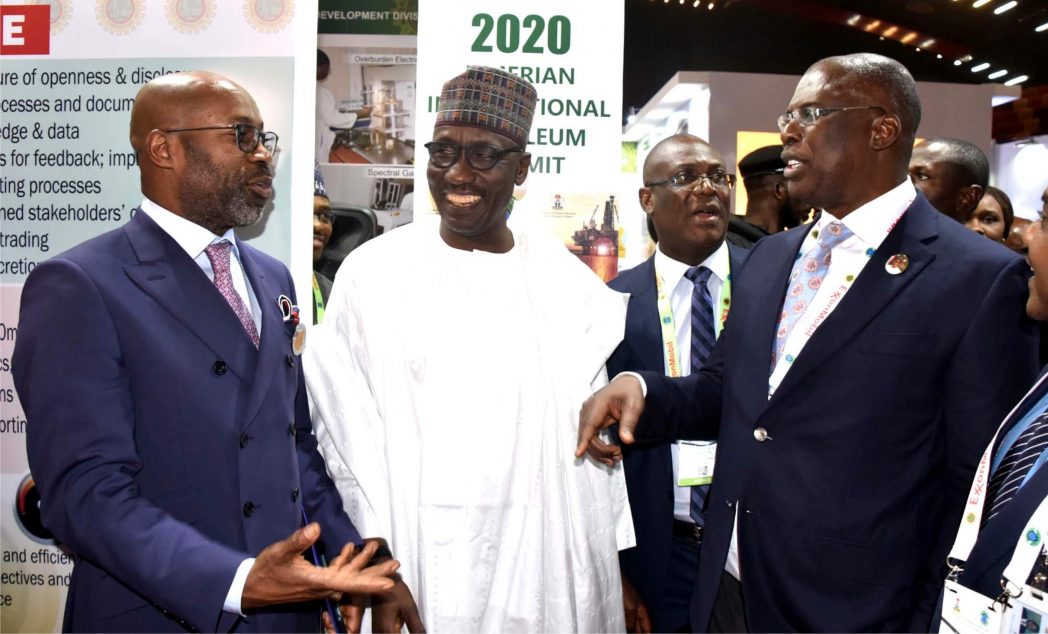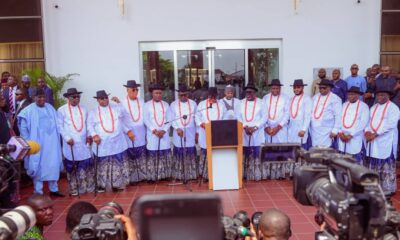Oil & Energy
Nigeria Lost $750m To Oil Theft In 2019 – NNPC

The Nigerian National Pe
troleum Corporation (NNPC) says the nation lost about 750 million dollars to oil theft in 2019.
The NNPC Group Managing Director, Malam Mele Kyari disclosed this in a statement signed by the Acting Spokesman for the corporation Mr Samson Makoji in Abuja on Tuesday.
Kyari said this when members of the Executive Intelligence Management Course 13 of the National Institute for Security Studies (NISS) visited the NNPC Towers.
He decried the growing activities of oil thieves and pirates which he described as a threat to the operations of the corporation.
The GMD who spoke on the topic: “Piracy in the Gulf of Guinea; Issues, Challenges for International Trade, National Security and Sustainable Development of Member States”, said that any threat to the corporation’s operations was a direct threat to the very survival of Nigeria as nation.
This, he said, was because of the strategic role of the corporation as an enabler of the economy.
He listed other security challenges facing the corporation to include vandalism of oil and gas infrastructure and kidnapping of personnel.
According to him, there is a deep connection between the various shades of insecurity challenges as they were all linked to what is happening in the Gulf of Guinea and the entire maritime environment.
He called for a concerted effort and synergy to secure oil and gas operations for the economic survival of the country.
The NNPC boss re-assured that in spite of the increase in demand for fossil oil crude oil would still remain relevant.
“Even by 2050, fossil fuel would account for 80 per cent of the energy mix, and there would still be consumption of at least, 100 million barrels of oil per day.
“ We are determined to remain relevant in the long term,” he assured.
In his presentation, NNPC Chief Operating Officer, Downstream, Mr Yemi Adetunji said in 2016, the Gulf of Guinea accounted for more than half of the global kidnappings for ransom, with 34 seafarers kidnapped out of 62 cases worldwide.
He said the corporation was working closely with security agencies to tackle the security challenges, and cited the “Operation Kurombe” that was recently conducted by the Nigerian Navy at the Atlas Cove as an example of such collaborative efforts.
Also, the Executive Director, National Institute of security Studies, Dr Ayodele Adeleke, called for synergy among the security agencies to tackle the security challenges not only in the Gulf of Guinea, but in the Nigerian Petroleum Industry generally.
The visiting team was drawn from 18 agencies within and outside Nigeria.
Oil & Energy
Bill Prohibiting Gas Flaring Passes 2nd Reading

The Bill for an act to prohibit gas flaring, encourage commodity utilisation, and provide for penalties and remedies for gas flaring violations has passed its second reading in the House of Representatives.
Sponsored by the Member representing Ikorodu Federal Constituency (APC, Lagos), Babajimi Adegoke Benson, the bill seeks to prohibit the flaring and venting of natural gas, except in strictly regulated circumstances, while encouraging the utilisation of gas resources to foster economic growth and energy generation.
The proposed legislation aims to mitigate the environmental, health, and economic impacts of gas flaring, aligning Nigeria’s oil and gas operations with international climate change commitments.
Offenders, who violate the provisions of the proposed law, would face stringent penalties, including fines of $5 per 1,000 standard cubic feet of gas flared and potential suspension of operations for repeat violations.
Leading debate on the general principles of the bill, Benson said gas flaring has plagued Nigeria for decades, resulting to severe environmental degradation, public health crises, and economic losses while it environmentally, contributes to greenhouse gas emissions, global warming, and acid rain, exacerbating climate challenges.
The lawmaker said public health impacts of the practice are equally dire, as pollutants from gas flaring cause respiratory and cardiovascular diseases, particularly among residents of communities close to flaring sites.
According to him, economically, flaring results in the waste of a valuable resource that could otherwise be harnessed for energy generation or exported to generate revenue.
Benson insisted that the bill was designed to address those issues while bringing Nigeria in line with global standards such as the Paris Agreement on climate change.
“The bill provides for a comprehensive prohibition of gas flaring except in emergencies or when explicitly authorised by the Nigerian Upstream Petroleum Regulatory Commission (NUPRC).
“Operators are required to submit and implement Gas Utilisation Plans, detailing how gas that would otherwise be flared will be captured, processed, or commercialised.
“Offenders, who violate these provisions, face stringent penalties, including fines of $5 per 1,000 standard cubic feet of gas flared and potential suspension of operations for repeat violations. Furthermore, the Bill ensures that communities affected by gas flaring are entitled to compensation and environmental restoration, creating a mechanism for redress.
“Transparency and accountability are integral to the enforcement framework of this Bill. Operators must submit regular reports on gas flaring incidents, which will be audited and made publicly available by the NUPRC. This approach ensures public oversight and stakeholder engagement, fostering trust and compliance.
“Nigeria’s adoption of this Bill positions the country to emulate such success, ensuring a balance between environmental stewardship and economic development.
“The implementation of this Bill will be overseen by the Nigerian Upstream Petroleum Regulatory Commission, which will monitor compliance through regular audits, enforce penalties, and facilitate gas utilisation projects in collaboration with operators and development partners.
“The Anti-Gas Flaring (Prohibition and Enforcement) Bill, 2024, is a timely and necessary response to one of Nigeria’s most pressing environmental challenges. Its provisions are both practical and forward-looking, addressing immediate concerns while laying the groundwork for a sustainable future.
“I urge all Honourable Members to support the Second Reading of this Bill as a demonstration of our collective commitment to environmental protection, public health and economic progress”, he added.
###
Oil & Energy
‘Indigenous Companies To Gain From Shell’s Contract Awards’

Oil major, Shell, has restated its commitment to the development of Nigerian companies through contract awards and scaling up of expertise.
Managing Director, Shell Nigeria Exploration and Production Company ((SNEPCO) Limited, Ron Adams, made the remark while speaking at the Opening Ceremony of the 13th edition of the Practical Nigerian Content forum held in Yenagoa, Bayelsa State, with the theme “Deepening the Next Frontier for Nigerian Content Implementation”.
Represented by the Manager, Business Opportunity, SNEPCO’s Bonga South-West Aparo Project, Olaposi Fadahunsi, he said several benefitting companies had taken advantage of the patronage to expand their operations and improve their expertise and financial strength.
Adams said, “Shell companies execute a large proportion of their activities through contracts with third parties, and Nigeria-registered companies have been key beneficiaries of this policy aimed at powering Nigeria’s progress”.
He emphasized that Shell companies in Nigeria also continued to develop indigenous manpower through scholarship programmes with over 3,772 undergraduate and 109 Niger Delta post graduate scholarships since 2016.
“As we speak, beneficiaries of the 13th edition of the Niger Delta Post Graduate Scholarship awards are pursuing their studies in the United Kingdom. The employability rate of the scheme is high with over 98% of the graduates who won the awards securing employment in the oil and gas industry, academia and Information Technology, among other sectors, within one year of completing their studies”.
He commended the Nigeria Content Development and Monitoring Board (NCDMB) for ensuring compliance with the Nigerian Content Act saying “Nigerian content will continue to be an important part of Shell operations”.
The four-day conference hosted by the Nigerian Content Development and Monitoring Board (NCDMB) and participating companies reviewed progress on the development of Nigerian content pertaining to the implementation of the Nigerian Oil and Gas Industry Development (NOGICD) Act since it was enacted in 2010.
Shell companies in Nigeria are among the more than 700 oil and gas entities that participated in the forum with a strong message of support for Nigerian companies, having awarded contracts worth $1.98 billion to the businesses in 2023 in continuing effort to develop Nigerian content in the oil and gas industry.
Oil & Energy
NNPC Begins Export From PH Refinery

The Nigerian National Petroleum Company Limited (NNPCL) has sold the first cargo of Port-Harcourt low sulfur straight run fuel oil (LSSR) to Dubai-based Gulf Transport & Trading Limited (GTT).
The company is expected to load the cargo in the coming days onboard the Wonder Star MR1 ship, signalling the commencement of operations at the plant and the exportation of petroleum products.
The ship would load 15,000 metric tons of the product, which translates to about 13.6 million litres.
Although the volume coming from the NNPC into the global market is still small, the development has the potential to impact the Very Low Sulphur Fuel Oil (VLSFO) benchmarks in the future, while changing the market realities for Atlantic Basin exporters into Nigeria and other regions.
The sulfur content of the export by NNPC stands at 0.26 per cent per wt and a 0.918 g/ml density at 15°C, according to Kpler, a data and analysis company.
The cargo was reportedly sold at an $8.50/t discount to the NWE 0.5 per cent benchmark on a Free on Board (FOB) basis.
Kpler reported that the development would help displace imports from traditional suppliers in Africa and Europe, as Nigeria’s falling clean product (CPP) imports are already decreasing, dragging imports into the wider West Africa region lower as well.
-

 News3 days ago
News3 days agoFubara Attends PDPGF Meeting In Asaba …..Back Court Verdict On National Secretary Position
-
Nation3 days ago
Okehi Clan Demands Recognition, Upgrade Of Chieftaincy Stool
-
Business24 hours ago
PETROAN Accuses Crude Oil Producers Of Diverting 500,000bpd Refineries-Bound Product
-
Business3 days ago
REA, RESCOs Sign Agreement To Establish 23 Mini-grids
-
News1 day ago
MAN Warns Against Further Hike In Electricity Tariff
-
Sports23 hours ago
W’Cup: Eagles Get Dates for Rwanda, Zimbabwe Qualifiers
-
News3 days ago
Telecom Operators Dismiss Talks With NLC On Tariff Hike
-
Politics3 days ago
How Akande Lied Against Me Over Bola Ige’s Case – Ladoja

